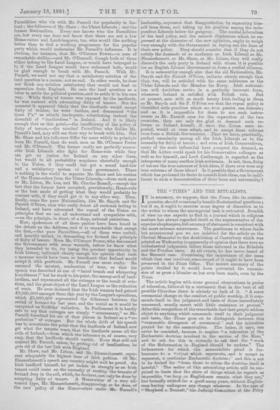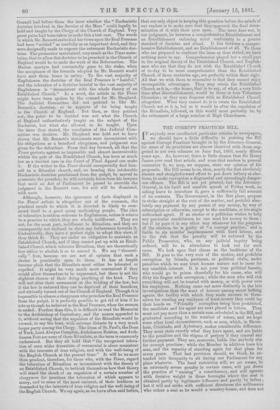THE " TIMES" AND THE RITUALISTS.
IT is necessary, we suppose, that the Times, like its contem- poraries, should occasionally handle Ecclesiastical questions ; but if so, it ought to exercise some degree of discretion as to the writer to whom the uncongenial task is entrusted. Breadth of view no one expects to find in a journal which in religious matters has always regarded itself as the representative of the superior shopkeepers, but accuracy of statement is consistent with the most extreme narrowness. The gentleman to whose facile but uninstructed pen we are indebted for the article on the Clerical Memorial to the Archbishop of Canterbury which was printed on Wednesday is apparently of opinion that there were no ecclesiastical judgments before those delivered in the Ridsdalo and the Purchas cases. At all events, he has never heard of the Bennett case. Considering the importance of the issue which that case involved, some record of it ought to have been preserved in the Times Office. The merest summary of the points decided by it would have prevented the commis- sion of as gross a blunder as has ever been made, even by the Times.
The article begins with some general observations in praise of toleration, followed by a statement that in the best of all possible Churches there is already no lack of it. " A mere ceremonial change in the conduct of public worship, if it com- mends itself to the judgment and taste of those immediately concerned, usually meets with little resistance or protest." After this recognition of the remarkable fact that people seldom object to anything which commends itself to their judgment and taste, the !Times goes on to distinguish between this "reasonable divergence of ceremonial" and the toleration prayed for by the memorialists. The latter, it says, can never be conceded, because it implies " a toleration of the Eucharistic doctrine involved in the service of the Mass," and to ask for this is virtually to ask that the " work of the Reformation in England should be undone." The forbearance for which the memorialists plead is for- bearance to a "ritual which represents, and is meant to represent, a particular Eucharistic doctrine ;" and this is not to be looked for " from those to whom the doctrine itself is hateful." The writer of this astonishing article will be sur- prised to learn that the state of things which he regards as impossible, " so long as Englishmen remain what they are," has formally existed for a good many years, without English-
men having undergone any change whatever. In the case of " Shepherd v. Bennett," the Judicial Committee of the Privy Council had before them the issue whether the " Eucharistic doctrine involved in the Service of the Mass " could legally be held and taught by the Clergy of the Church of England. Very great pains had been taken to make this a test case. The words in which Mr. Bennett embodied his views upon the Real Presence had been " settled " as carefully as an important deed, and they were designedly made to express the extremest Eucharistic doc- trine. The prosecutor maintained, very much as the Times main- tains, that to allow this doctrine to be preached in the Church of England would be to undo the work of the Reformation. The Marian martyrs had contentedly gone to the stake, when the acceptance of the formula adopted by Mr. Bennett would have sent them home in safety. To the vast majority of Englishmen the doctrine of the Real Presence is "hateful," and the toleration of a doctrine hateful to the vast majority of Englishmen is "inconsistent with the whole theory of an Established Church." In a word, the article in the Times might have been spoken by the counsel for Mr. Shepherd. The Judicial Committee did not pretend to like Mr. Bennett's doctrine, or to approve of its being taught in the Church of England. But then, as they pointed out, the point to be decided was not what the Church of England authoritatively taught on the subject of the Eucharist, but what she allowed to bo taught. Upon the issue thus stated, the conclusion of the Judicial Com- mittee was decisive. Mr. Shepherd was held not to have shown that Mr. Bennett's statements were inconsistent with his obligations as a beneficed clergyman, and judgment was given for the defendant. From that day forward, all that the Times protests against as impossible and almost inconceivable within the pale of the Established Church, has been as much law as a decided case in the Court of Final Appeal can make it. If the writer in the Times should unexpectedly find him- self in a Ritualist church, and, on hearing this intolerable Eucharistic doctrine proclaimed from the pulpit, be moved to prosecute the preacher, he will certainly learn from his lawyers that until an Act of Parliament be passed to override the judgment in the Bennett case, his suit will be dismissed, with costs.
Although, however, the ignorance of facts displayed in the Times' article is altogether out of the common, the practical result to which it is directed is likely to com- mend itself to a good many unthinking people. The idea of toleration is seldom welcome to Englishmen, unless it relates to a practice to which they are wholly indifferent. They are not, for the most part, indifferent to Ritualism, and they are consequently not inclined to show any forbearance towards it. Undoubtedly, they have a perfect right to adopt this view, if they think fit. They are under no obligation to maintain an Established Church, and if they cannot put up with an Estab- lished Church which tolerates Ritualism, they are theoretically free either to abolish it or to amend it. We say " theoreti- cally" free, because we are not of opinion that such a choice is practically open to them. It has at length become plain that the Ritualists must either be tolerated or expelled. It might be very much more convenient if they would allow themselves to be suppressed, but there is not the slightest chance of their doing anything of the kind. They will not alter their ceremonial at the bidding of the law, but if the law is enforced they can be deprived of their benefices, and virtually turned out of the Church of England. Though it is impossible to silence a clergyman who preaches the Real Presence from the pulpit, it is perfectly possible to get rid of him if he acts as though he believed in the Real Presence, when the sermon is ended. Further than this, it is difficult to read the Memorial to the Archbishop of Canterbury, and the names appended to it, without seeing that the expulsion of the Ritualists would be viewed, to say the least, with extreme distaste by a very much larger party among the Clergy. The Dean of St. Paul's, the Dean of York, Lord Alwyne Compton, Archdeacon Balaton, and Arch- deacon Pott are none of them Ritualists, as the term is commonly understood. But they all hold that "the recognised tolera- tion of even wider diversities of ceremonial is alone oonsistent with the interests of true religion, and with the well-being of the English Church at the present time." It will be no more than prudent, therefore, for those who, with the Times, regard the toleration of Ritualism as inconsistent with the theory of an Established Church, to bethink themselves how that theory will stand the shock of an expulsion of a certain number of clergymen for practices the toleration of which appears to many, and to some of the most eminent, of their brethren as demanded by the interests of true religion and the well-being of the English Church. We say again, as we have often said before, that our only object in keeping this question before the minds of our readers is to make sure that they approach the final deter- mination of it, with their eyes open. The issue does not, in our judgment, lie between a comprehensive Establishment and an Establishment enforcing strict conformity to a precise standard of doctrine and ritual. It lies between a compre- hensive Establishment, and no Establishment at all. To those who are prepared to confront the issue as thus stated, we have nothing more to say. Comprehension played but a small part in the original theory of the Established Church, and English- men who say that they do not wish the Established Church of to-day to be more comprehensive than the Established Church of three centuries ago, are perfectly within their right. All that we wish them to remember is that they cannot enjoy incompatible advantages. They may retain the Established Church as it is,—the home, that is to say, of what, a very little time after disestablishment, would be three or four Voluntary Churches ; or they may dispense with an Established Church altogether. What they cannot do is to retain the Established Church not as it is, but as it would be after the expulsion of the Ritualists, followed, as this would most probably be, by the retirement of a large number of High Churchmen.



































 Previous page
Previous page